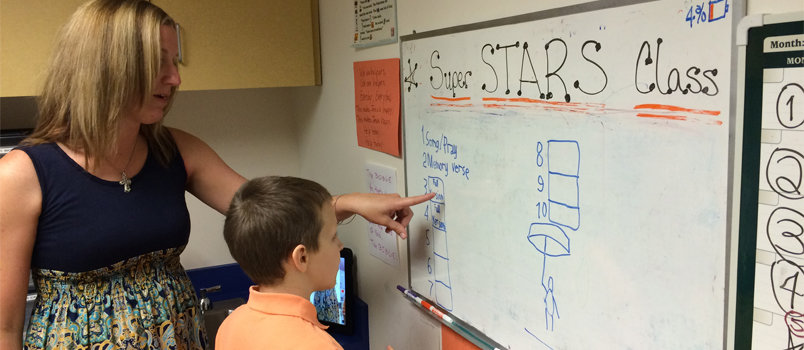 Teacher Amanda Price goes over the day's schedule with Cal, a part of the STARS ministry at Cartersville First Baptist Church. SCOTT BARKLEY/Index
Teacher Amanda Price goes over the day's schedule with Cal, a part of the STARS ministry at Cartersville First Baptist Church. SCOTT BARKLEY/IndexEven with only one student, there’s a lot of activity in the small classroom at Cartersville First Baptist Church.
It includes the basics of the “big church” service downstairs and children’s worship down the hall – music, Scripture, and a lesson. Ten-year-old Cal is asked by teacher Kim Seijo to recite memory verses past and current, doing so with minimal aid.
Steps taken to provide a solid learning environment for autistic children like Cal make the difference in this classroom. In 2012 Seijo launched an outreach at First Baptist for families of children with special needs. Soon, CFBC’s STARS ministry had a teaching space and technology (iPads, Apple TV, dedicated Wi-Fi), but needed something else.
“We asked for volunteers and got them,” Seijo says. “Without those teachers, special buddies, and consistent volunteers to assist in the ministry, we wouldn’t have been able to help our STARS families over the years.”
“At CFBC, we have multiple families with children on the autism spectrum with very different needs. It is important to work directly with each family to understand the goals they have for their children and to put a teaching plan together that will best suit the child,” says Seijo.
A 2014 report by the Centers for Disease Control and Prevention revealed that the number of children in the U.S. with an autism spectrum disorder had increased 30% from two years earlier to 1 in 68. That growth doesn’t just represent individual children for Seijo and leaders of similar ministries, but entire families affected by autism and pushed into a way of living life differently.
Church member Amanda Price is the ministry’s lead teacher. Price earned a Bachelor’s degree in biology at Kennesaw State University before a year-and-a-half ago feeling led to be a teacher. Currently, she’s finishing a Master of Arts in Education, Special Education degree at the University of Phoenix.
“I felt a draw to before even realizing the need for teachers,” she says. Those connections initially formed through a friend with an autistic child, patients at the dental office where she works, and her involvement in the Bartow County Challenge League, an organization that provides opportunities for those with special needs to be involved in sports and cheerleading.
Developing a learning plan for children with special needs begins with the parents, she adds. “You have to understand where their child is and goals they want to reach. This helps me get ideas for techniques in working with Cal and helping him retain more information. We make things hands-on with lots of review.
“You have to be flexible, patient, and willing to give him the ability to start again when he’s ready. Make it as fun as you can so he wants to learn and retain it.”
In forming a ministry for autistic children, Seijo cites Johnson Ferry Baptist in Marietta and Oakland Heights Baptist in Cartersville as helpful partners in addition to online resources such as Autism Speaks, The Inclusive Church, and the Special Buddies curriculum through LifeWay.
“We’ll focus on a key concept and facilitate the discussion through movies, pictures, and tactile options such as play-dough, Legos, Lincoln logs, or music makers in addition to movement through music, arm motions, or verbal repetition,” she says.
Children’s minister Lisa Lovett advises a slowed-down approach. “Take baby steps. Sometimes you’ll want to start a new ministry and get overwhelmed thinking you’re going to have an entire classroom,” she points out. “Start with your immediate need, which may only be one or two students. Research and call other churches for their advice. That way you’re able to figure out your best fit for the church and volunteers. It’s a growing process.”
Lovett notes another invaluable asset of the STARS ministry. Seven “shadows” – teenagers in the student group – work with special needs children each week in building relationships one-on-one and becoming an ally when parts of the kids worship or Bible lesson become a challenge.
“These volunteers encourage the children to participate in the activities or just sit and help. It helps them grow and be a part of the group. We have a student who is very smart, but sometimes gets frustrated when he’s attempting to ask a question. The volunteer can sense his frustration and voice that question or ask how to be a part of the game being played.”
“Teaming up those teenagers with a STARS student has led to some incredible success stories,” says Seijo, whose husband, David, is also heavily involved in the ministry. “The STARS student feels important, loved, and cool hanging out with teenagers while the teen uses tools they’ve been learning in youth group to put their faith into action.”
“Teaming up those teenagers with a STARS student has led to some incredible success stories.”
Price recommends talking with parents to really figure out where they are in the process. “Some are open to having special education teachers at church and some aren’t. Our classes help eliminate distractions and improve how much information their child retains from the Bible story.”
“The feedback from parents has been phenomenal,” says Lovett. “Our number one priority is for the parent to feel comfortable knowing we’re loving their child so both of them can be spiritually fed at church.”